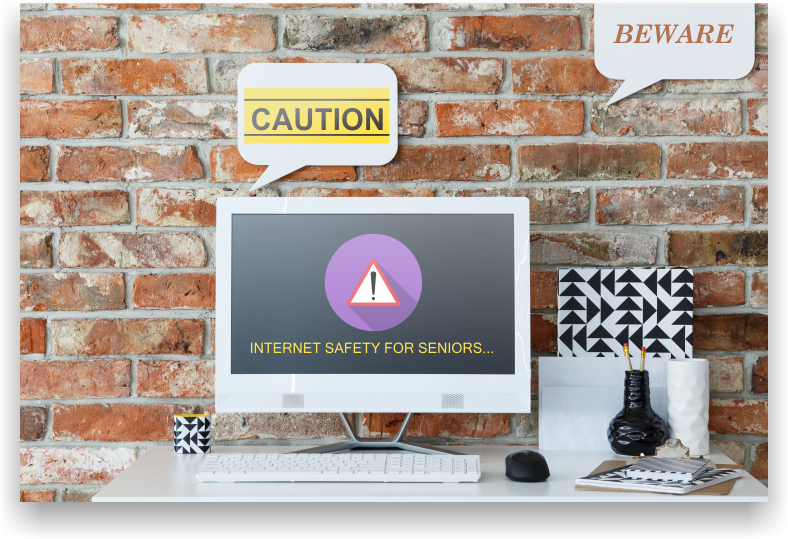Technology has evolved so much in recent decades. The internet being one of the most substantial creations. In fact, there are almost 4 Billion people using it, accounting for approximately 40% of the world’s population. People of all ages are living in this world driven by its’ positive uses, like: productivity, communication, E-commerce, Research and development, entertainment and global socialization. It’s no surprise that a tool as powerful as the internet would be used for hurting others, making it especially bad for vulnerable demographics like children and seniors. Practicing internet safety for seniors can help prevent families from being a cyber-crime statistic..
We’ve probably all been affected by internet dangers in one way or another, like; scammers, viruses, trojans, pop-up ads, spam emails, sleazy sales people, Cat-phishing, malware and spyware to mention the least. It’s a dangerous landscape that requires necessary attention and precautions.
“The Orlando Sentinel (using a Department of Justice report) points out that elderly people lose out on about
$3 BILLION ANNUALLY.
Why Seniors are so Vulnerable to Internet Scams

It boils down to just a few facts of life. For instance, as we age we learn more about life (most of us), by landing a good paying job with retirement options/pensions. Certainly, more capable of saving for their retirements. Some seniors could potentially have millions of dollars to get them through their golden years. In fact, this is enough to attract the wolves. Additionally, seniors are more trusting in nature. This makes them more susceptible to smooth-talking criminals aiming to take their money. They will also buckle under the high-pressure interaction the scammers force on them. This, coupled with a lowered cognitive ability that presents with age, they become the perfect targets.
“Scammers can look up a target’s Facebook page and pretend to be the authorities or a kidnapper in a far-off place demanding money to release a loved one or head off an impending arrest. Even worse: sophisticated online dating scams that target people living alone. That type of scam takes longer to execute but can be financially and emotionally devastating.”
“An ounce of prevention is worth a pound of cure.”
~ Benjamin Franklin
“There are three things in the world that deserve no mercy; hypocrisy, fraud, and tyranny. “
~Frederick William Robertson
“Who is going to believe a con artist? Everyone, if she is good.”
~Andy Griffith
9 Common Internet Scams That Target Seniors
1. Facebook Impersonation
– Hijacking a loved ones account to exploit money or other sensitive information.
2. Fake Work Scam
– Targeting seniors that are looking to add a little padding to their retirement are tricked into offering account info.
3. Sweetheart Scam
– Designed to coherence seniors seeking companionship to fall in love without actually meeting, and over time they convince them to send money for debts, family issues, etc.
4. Malware
– As simple as opening an email. This threat can allow hacker into a seniors personal files on there personal computer, potential giving them access to banking, retirement data, etc.
5. Vacation Scam
– We’ve all seen the ads and pop-ups offering a cheap or FREE trip to Hawaii (or somewhere ideal) in exchange for some information.
6. Fake Prescription Drugs
– Seniors are always looking for ways to stretch their money, so deals on their everyday prescriptions makes sense. Scammers exploit this by sell fake drugs.
7. Sweepstakes
– Win a Car, a House, $10,000.00. There are endless chances to win things. The odds you’re tapping into a legitimate sweepstakes are very low in these modern time.
8. Credit Card Scams
– Sites designed to lure seniors with great limits and 0% APR, presenting a fake application and using the data to steal their savings.
9. Fake Shopping Sites
– Hackers spend countless hours mimicking relevant shopping sites. When you think you’re buying from a trusted source, you’re really just handing them your account details.
Avoiding the Scams – Internet Safety for Seniors
In our opinion, it’s especially important to keep family involved in decisions. Consider the reasons why seniors are more susceptible to cyber-crimes. Collectively, it’s easy to understand that family can be a major deterrent for criminals. Don’t give credit card info to strangers, and know that things that sound too good to be true, they usually are. They call them “Get Rich Quick Schemes” for a reason, they’re schemes!
Avoid opening emails from unknown senders and question everything. The more you question the validity of a scammer, the less likely one becomes a victim. Throw trust out the window while online, especially with strangers. You must maintain a healthy level of skepticism when involved in any size transactions. Ensure all sites have the Padlock icon. A padlock icon, or lock icon, displayed in a web browser indicates a secure mode where communications between browser and web server are encrypted. This type of connection is designed to prevent anyone from reading or modifying the data you exchange with the website.
Reporting the Scams
- FBI – Federal Bureau of Investigation
- SEC – Security and Exchange Commission
- BBB – Better Business Bureau
- SSA – Social Security Administration
- FTC – Federal Trade Commission
- Your Bank

Sources:
- https://www.aginginplace.org/internet-scams-affecting-elderly/
- https://www.usatoday.com/story/money/personalfinance/2018/03/17/more-fraudsters-scamming-senior-citizens-through-technology-and-its-costing-them-millions/428406002/
- https://staysafeonline.org/blog/3-internet-scams-targeting-seniors-avoid/
- https://www.reference.com/technology/technology-good-thing-6354638cbf9bc238http://orleansmarketing.com/35-technology-facts-stats/
If you or someone you care about is at risk of internet scams, Ask for help from family first. If family lives too far or works too often, call us to schedule a No Obligation CAREConsult™ with a Love Right™ Care Service Representative. You’re in luck because we manifest kindness professionally.










Wow, what an insightful article on internet safety for seniors! It’s crucial to stay informed about these issues, especially as technology evolves. Ensuring our loved ones have the knowledge and tools to navigate the online world safely is so important. For more great tips on senior care and thriving in today’s digital age, I highly recommend checking out SeniorThrive.com. They offer invaluable resources and expert advice that complement the insights shared here perfectly!